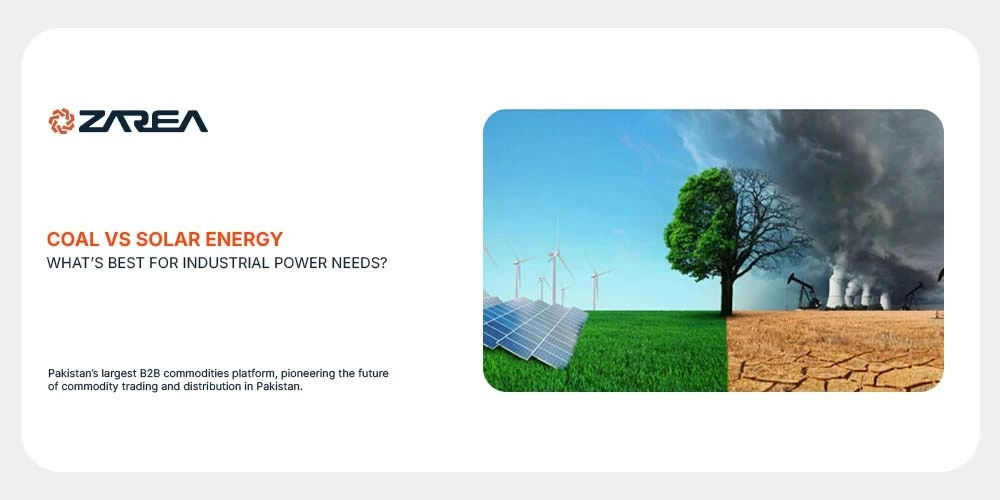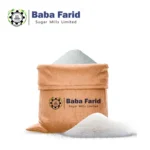Introduction – Coal vs Solar Energy:
The debate between coal vs solar energy continues to gain momentum nowadays. This is because of the fast-evolving industrial energy solutions landscape that is changing everything. Industries are facing mounting pressure to switch to alternative energy sources. Meanwhile their high power consumption and round-the-clock operations build those pressures. That’s why they have been very sustainable, dependable and efficient economical and environmental standpoint all the time.
Solar energy is quickly establishing itself as a cleaner, more intelligent substitute as compared to coal. So coal has been the driving force behind global industry for more than a century. But in the present world, which energy source is actually the greatest for industrial use? Let’s dissect this analogy to learn more.
To see product listings, order in bulk, and get the best deals, visit Zarea right now! The biggest business-to-business (B2B) commodities marketplace in Pakistan, it is establishing the benchmark for the country’s future commodity commerce and distribution.
Coal – The Conventional Industrial Powerhouse:
Industrial power generation has always relied heavily on coal. For big businesses that run around the clock, coal-fired plants provide constant performance due to their high energy density and capacity to generate a steady, uninterrupted power supply.
Benefits of Coal for Business:
- More power per unit is packed into a high energy density.
- Base-load generator that is dependable and produces electricity continuously.
- Existing infrastructure: Global supply chains and power plants are already in existence.
The disadvantages of coal:
- Significant environmental harm: This may include air pollution, high CO2 emissions, and devastation from mining that cause huge environmental harms.
- Non-renewable: The supply of coal is running low day by day as it is also a non-renewable energy so far.
- Cost volatility: Dependent on fuel imports, subject to market price swings, and subject to fines from the government.
Solar Energy – The Next Big Thing in Renewable Energy:
As we know photovoltaic (PV) devices use the sun’s rays to produce solar energy. Over the years it has evolved from an experimental concept to a major energy source which is outstanding. Due to its fast-falling costs, enhanced technology, and growing efficiency, solar energy is emerging as a competitive industrial power source. Especially when combined with energy storage systems that’s led it to the next level renewable energy source.
Solar’s benefits for industry:
- Eco-friendly: When in use it produces no emissions which makes it an eco friendly energy source.
- Long-term savings: After installation, there is small upkeep and no fuel expense which makes it a long-term energy savings source.
- Scalability: Adaptable to large industrial parks or small enterprises.
- Energy independence: Using solar power on-site lessens dependency on the national grid.
Solar’s disadvantages:
- Weather-dependent: The amount of sunshine affects energy output.
- High initial investment: In the absence of subsidies, setup expenses may be high.
- Storage is necessary; for round-the-clock operations, batteries or hybrid systems are required.
Coal vs Solar Energy – A Side-by-Side Comparison:
| Feature | Coal Energy | Solar Energy |
|---|---|---|
| Energy Efficiency | 33%–40% | 15%–22% |
| Availability | Continuous (base-load) | Intermittent (weather-based) |
| Environmental Impact | High (CO₂, SO₂, NOx emissions) | Minimal (during operation) |
| Resource Type | Non-renewable | Renewable |
| Operational Cost | High (fuel, transport, fines) | Low (no fuel required) |
| Installation Cost | Moderate | High (but decreasing) |
| Lifespan & Maintenance | 30–40 years, intensive | 25–30 years, low maintenance |
Environmental Impact – Coal vs Solar:
Coal has several negative effects on the environment. Coal has a major role in air pollution and climate change, from habitat loss and deforestation during mining to the emission of greenhouse gases and fine particulate matter during burning.
On the other hand, once built, solar energy leaves a very small environmental impact. Although some trash and emissions are produced during the production and disposal of solar panels, their overall impact is far less detrimental. Since solar power systems don’t release any air pollutants while in use, they can help businesses fulfill sustainability targets and adhere to increasingly stringent international emission standards.
Economic Viability in the Long Run:
Coal frequently seems to have lower short-term capital costs, particularly in nations with established infrastructure or subsidies that lower setup costs. However, with time, this image drastically shifts:
- Mining, transportation, labor, maintenance, pollution control, and fines from the government are all ongoing expenses associated with coal.
- Solar has a greater initial installation cost but very low ongoing expenditures over many years. Every year, solar grows more alluring due to declining panel costs and tax benefits.
While coal is still susceptible to fuel market volatility, industries that invest in solar energy today may benefit from stable power rates for more than 25 years.
Coal vs Solar Energy – Which Is Better for Industrial Needs?
The choice between coal and solar energy for industrial applications depends on the particular requirements of the business:
Select coal if:
- In isolated locations without grid or storage assistance, you need constant high-output power.
- Environmental concerns are subordinated to short-term capital constraints.
- You presently use coal-based infrastructure, thus switching to renewable energy is not feasible at this time.
Select Solar if:
- Your goals are to increase sustainability and reduce long-term operating expenses.
- There is a lot of ground or rooftop area available to your facility.
- You wish to protect your energy supply from future environmental restrictions and carbon prices.
- For dependability, you can use hybrid systems or batteries to augment solar power.
Coal vs Solar energy in Pakistan – A Local Perspective:
Sahiwal and Thar, two coal-fired power plants in Pakistan, have been crucial in maintaining the stability of the country’s electrical supply. But because of their heavy reliance on imported coal, these projects raise questions about growing costs and energy security.
In the meantime, solar energy is becoming more and more popular in both the home and commercial sectors. Industries are being encouraged to switch to solar via the government’s Green Energy Transition Plan and Net Metering legislation.
Industrial areas in Punjab, Sindh, and Balochistan are perfect for solar plant installations since they receive enough of sunlight throughout the year.
Final Thoughts – Solar Power Leads the Way:
Coal still provides dependability, but at the expense of sustainability, health, and future financial strains. Solar energy is the most sensible and future-ready option for industrial power because of its cleaner operations, reduced long-term costs, and environmental benefits.
The difference between fossil fuels and renewables keeps getting smaller as solar efficiency rises and battery technologies advance. Clean, decentralized, and self-sufficient energy systems are the way of the future for business, and solar is spearheading this shift.


































